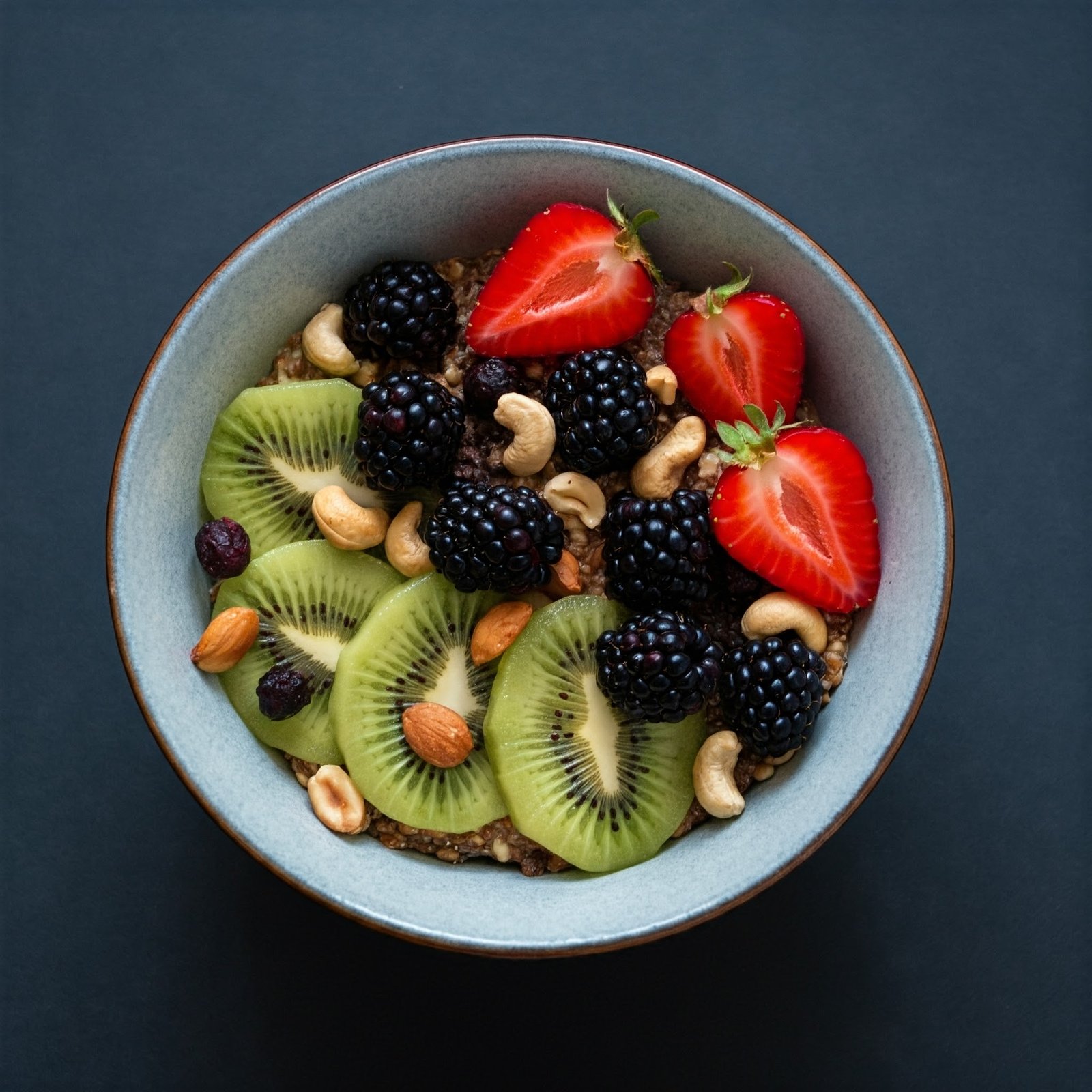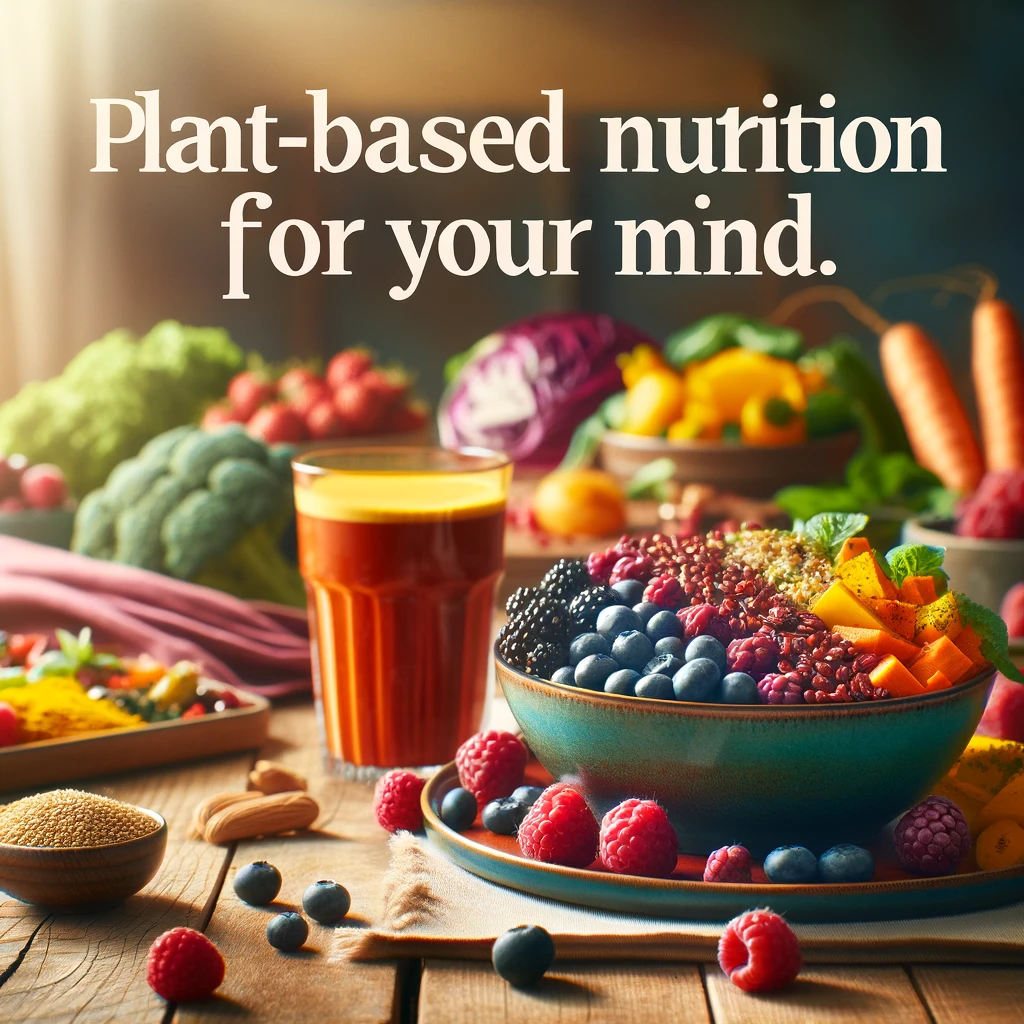Introduction:
In today’s fast-paced world, we’re constantly searching for ways to improve our mental well-being. While practices like meditation and regular exercise are well-known contributors to mental health, diet plays an equally crucial role that’s often underestimated. Hi, I’m Romeo, and today we’ll explore how plant-based nutrition can profoundly impact your mental health. From mood-boosting nutrients to reducing inflammation in the brain, science backs up the significant benefits of a plant-based diet on our mental well-being.

1. The Connection Between Food and Mood
Our diet has a direct impact on the chemical processes in our brain. The brain needs a continuous supply of nutrients to function optimally, and many of these nutrients come from our diet. A plant-based diet, which emphasizes fruits, vegetables, legumes, nuts, seeds, and whole grains, is rich in essential vitamins, minerals, and antioxidants that support brain health.
The Role of Neurotransmitters:
- Serotonin, often called the “feel-good” hormone, is a neurotransmitter that regulates mood, sleep, and appetite. Around 90% of serotonin is produced in the gut, meaning gut health is deeply tied to mental well-being.
- Diets rich in fiber from plant-based sources support a healthy gut microbiome, which in turn promotes serotonin production.
Research Insight: A study published in Frontiers in Psychology (2019) found that individuals who adhered to a plant-based diet reported lower levels of anxiety and depression compared to those consuming a standard Western diet.
2. Key Nutrients in Plant-Based Foods That Boost Mental Health
Plant-based foods are loaded with nutrients that support brain function and mental well-being. Here’s a breakdown of some essential nutrients:
| Nutrient | Source | Mental Health Benefit |
|---|---|---|
| Omega-3 Fatty Acids | Flaxseeds, chia seeds, walnuts | Supports brain function and reduces symptoms of anxiety |
| B Vitamins | Leafy greens, legumes, whole grains | Improves energy levels and reduces symptoms of depression |
| Magnesium | Almonds, spinach, black beans | Helps manage stress and supports neurotransmitter function |
| Antioxidants | Berries, dark leafy greens, nuts | Protects brain cells from oxidative stress |
| Tryptophan | Bananas, oats, nuts | Precursor to serotonin, which stabilizes mood |
Omega-3 Fatty Acids:
Plant-based sources of omega-3s, such as flaxseeds and walnuts, are rich in alpha-linolenic acid (ALA), which the body converts into EPA and DHA — essential for brain health. A deficiency in omega-3s has been linked to increased rates of depression and mood disorders.
Scientific Study: Research published in the Journal of Clinical Psychiatry (2018) found that supplementing omega-3s in individuals with depression led to a significant improvement in their symptoms.

3. Plant-Based Diets and Reduced Inflammation
Chronic inflammation in the body has been linked to a higher risk of mental health disorders, including depression and anxiety. A diet high in processed foods, sugars, and unhealthy fats can exacerbate inflammation, while a plant-based diet can help mitigate it.
How Plant-Based Foods Reduce Inflammation:
- Antioxidants: Plant-based foods like berries and leafy greens contain antioxidants that fight free radicals and reduce oxidative stress.
- Fiber: High-fiber foods promote a healthy gut, which lowers inflammation levels in the brain.
Research Finding: A study published in Molecular Psychiatry (2020) found that individuals who consumed a diet rich in anti-inflammatory plant-based foods had lower markers of inflammation and reduced risk of developing depression.
4. The Gut-Brain Connection
The gut-brain axis is a complex communication system between the gut and the brain. The gut houses trillions of bacteria that influence brain function and mental health. A diverse and healthy gut microbiome, supported by plant-based foods, can lead to better mental health outcomes.
Prebiotics and Probiotics:
- Prebiotics: Found in foods like garlic, onions, and bananas, prebiotics feed the beneficial bacteria in the gut.
- Probiotics: While plant-based options like sauerkraut and kimchi are excellent sources of probiotics, they help maintain a healthy gut environment.
Interesting Fact: The American Journal of Psychiatry (2017) reported that individuals with a balanced gut microbiome had a lower risk of developing mental health disorders.
5. Practical Tips to Boost Mental Well-Being with Plant-Based Nutrition
- Eat a Rainbow: Incorporate a variety of colorful fruits and vegetables to maximize the intake of different antioxidants and phytonutrients.
- Start Your Day with Whole Grains: Breakfasts like oatmeal or quinoa provide slow-releasing energy and stabilize mood throughout the day.
- Snack Smart: Choose nuts, seeds, and fruit for brain-boosting nutrients instead of processed snacks.
- Stay Hydrated: Dehydration can affect mood and cognitive function, so drink plenty of water throughout the day.
- Mindful Eating: Take time to savor your meals, which can improve digestion and reduce stress.
6. Flavorful Plant-Based Meals to Try for Better Mental Health
1. Berry Smoothie Bowl:
A blend of mixed berries, banana, and spinach topped with chia seeds, walnuts, and shredded coconut. This meal is rich in antioxidants and omega-3s.
| Meal | Ingredients | Mental Health Benefit |
|---|---|---|
| Berry Smoothie Bowl | Berries, banana, spinach, chia seeds, walnuts | Boosts brain health and fights inflammation |
2. Chickpea Buddha Bowl:

Roasted chickpeas, quinoa, avocado, and mixed greens drizzled with tahini sauce. A balanced meal loaded with protein, fiber, and healthy fats.
| Meal | Ingredients | Mental Health Benefit |
|---|---|---|
| Chickpea Buddha Bowl | Chickpeas, quinoa, avocado, mixed greens | Supports gut health and stabilizes mood |
3. Warm Turmeric Latte:
A soothing blend of plant-based milk, turmeric, cinnamon, and a touch of maple syrup. Turmeric has powerful anti-inflammatory properties.
| Meal | Ingredients | Mental Health Benefit |
|---|---|---|
| Warm Turmeric Latte | Plant-based milk, turmeric, cinnamon, maple syrup | Reduces inflammation and promotes calmness |
FAQs
1. Can a plant-based diet improve mental health?
Yes, studies show that a plant-based diet rich in fruits, vegetables, nuts, and whole grains can improve mood, reduce anxiety, and support overall brain health.
2. What are the best plant-based foods for mental well-being?
Foods high in omega-3s (like walnuts), antioxidants (like berries), and fiber (like whole grains) are excellent for mental well-being.
3. How does fiber affect mental health?
Fiber promotes a healthy gut microbiome, which is linked to serotonin production and better mental health.
4. Are there any drawbacks to a plant-based diet for mental health?
While a plant-based diet has many benefits, it’s important to ensure you’re getting enough vitamin B12, omega-3s, and iron, which may require supplementation or careful meal planning.
5. How long does it take to see mental health benefits from a plant-based diet?
Improvements in mood and mental clarity can be noticed within a few weeks of consistently following a plant-based diet.
Conclusion:
The science behind plant-based nutrition and mental well-being is compelling. By nourishing your body with nutrient-dense, plant-based foods, you’re also feeding your mind and supporting your emotional health. Embrace the power of plants and watch how your mood and mental clarity improve over time.
With love and health,
Romeo

